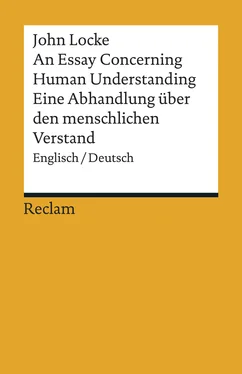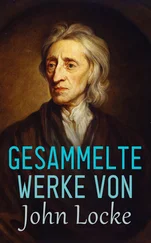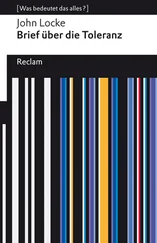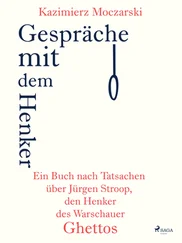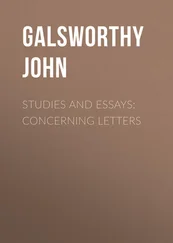§ 22. I have in what just goes before, been engaged in Physical Enquiries a little farther than, perhaps, I intended. But it being necessary, to make the Nature of Sensation a little understood, and to make the difference between the Qualities in Bodies , and the Ideas produced by them in the Mind , to be [148]distinctly conceived, without which it were impossible to discourse intelligibly of them; I hope, I shall be pardoned this little Excursion into Natural Philosophy, it being necessary in our present Enquiry, to distinguish the primary , and real Qualities of Bodies, which are always in them ( viz . Solidity, Extension, Figure, Number, and Motion, or Rest; and are sometimes perceived by us, viz . when the Bodies they are in, are big enough singly to be discerned) from those secondary and imputed Qualities , which are but the Powers of several Combinations of those primary ones, when they operate, without being distinctly discerned; whereby we also may come to know what Ideas are, and what are not Resemblances of something really existing in the Bodies, we denominate from them.
§ 23. The Qualities then that are in Bodies rightly considered, are of Three sorts .
First , the Bulk, Figure, Number, Situation, and Motion, or Rest of their solid Parts; those are in them, whether we perceive them or no; and when they are of that size, that we can discover them, we have by these an Idea of the thing, as it is in it self, as is plain in artificial things. These I call primary Qualities .
Secondly , The Power that is in any Body, by Reason of its insensible primary Qualities , to operate after a peculiar manner on any of our Senses, and thereby produce in us the different Ideas of several Colours, Sounds, Smells, Tasts, etc . These are usually called sensible Qualities.
[150] Thirdly , the Power that is in any Body, by Reason of the particular Constitution of its primary Qualities , to make such a change in the Bulk , Figure , Texture , and Motion of another Body , as to make it operate on our Senses, differently from what it did before. Thus the Sun has a Power to make Wax white, and Fire to make Lead fluid. These are usually called Powers.
The first of these, as has been said, I think, may be properly called real Original , or primary Qualities , because they are in the things themselves, whether they are perceived or no: and upon their different Modifications it is, that the secondary Qualities depend. […]
[…]
§ 26. To conclude, beside those before mentioned primary Qualities in Bodies, viz . Bulk, Figure, Extension, Number, and Motion of their solid Parts; all the rest, whereby we take notice of Bodies, and distinguish them one from another, are nothing else, but several Powers in them, depending on those primary Qualities; whereby they are fitted, either by immediately operating on our Bodies, to produce several different Ideas in us; or else by operating on other Bodies, so to change their primary Qualities, as to render them capable of producing Ideas in us, different from what before they did. The former of these, I think, may be called Secondary Qualities , immediately perceivable : The latter, Secondary Qualities , mediately perceivable .
Of Perception
§ 1. PERCEPTION , as it is the first faculty of the Mind, exercised about our Ideas ; so it is the first and simplest Idea we have from Reflection, and is by some called Thinking in general. Though Thinking, in the propriety of the English Tongue, signifies that sort of operation of the Mind about its Ideas , wherein the Mind is active; where it with some degree of voluntary attention, considers any thing. For in bare naked Perception , the Mind is, for the most part, only passive; and what it perceives, it cannot avoid perceiving.
§ 2. What Perception is , every one will know better by reflecting on what he does himself, when he sees, hears, feels, etc . or thinks, than by any discourse of mine. Whoever reflects on what passes in his own Mind, cannot miss it: And if he does not reflect, all the Words in the World, cannot make him have any notion of it.
§ 3. This is certain, That whatever alterations are made in the Body, if they reach not the Mind; whatever impressions are made on the outward parts, if they are not taken notice of within, there is no Perception. Fire may burn our Bodies, with no other effect, than it does a Billet, unless the motion be continued to the Brain, and there the sence of Heat, or Idea of Pain, be produced in the Mind, wherein consists actual Perception .
§ 4. How often may a Man observe in himself, that whilst his Mind is intently employ’d in the contemplation of some [154]Objects; and curiously surveying some Ideas that are there, it takes no notice of impressions of sounding Bodies, made upon the Organ of Hearing, with the same alteration, that uses to be for the producing the Idea of a Sound? A sufficient impulse there may be on the Organ; but it not reaching the observation of the Mind, there follows no perception: And though the motion, that uses to produce the Idea of sound, be made in the Ear, yet no sound is heard. Want of Sensation in this case, is not through any defect in the Organ, or that the Man’s Ears are less affected, than at other times, when he does hear: but that which uses to produce the Idea , though conveyed in by the usual Organ, not being taken notice of in the Understanding, and so imprinting no Idea on the Mind, there follows no Sensation. So that where-ever there is Sense , or Perception , there some Idea is actually produced , and present in the Understanding.
[…]
§ 8. We are farther to consider concerning Perception, that the Ideas we receive by sensation, are often in grown People alter’d by the Judgment , without our taking notice of it. When we set before our Eyes a round Globe, of any uniform colour, v. g . Gold, Alabaster, or Jet, ’tis certain, that the Idea thereby imprinted in our Mind, is of a flat Circle variously shadow’d, with several degrees of Light and Brightness coming to our Eyes. But we having by use been accustomed to perceive, what kind of appearance convex Bodies are wont to make in us; what [156]alterations are made in the reflections of Light, by the difference of the sensible Figures of Bodies, the Judgment presently, by an habitual custom, alters the Appearances into their Causes: So that from that, which truly is variety of shadow or colour, collecting the Figure, it makes it pass for a mark of Figure, and frames to it self the perception of a convex Figure, and an uniform Colour; when the Idea we receive from thence, is only a Plain variously colour’d, as is evident in Painting. To which purpose I shall here insert a Problem of that very Ingenious and Studious promoter of real Knowledge, the Learned and Worthy Mr. Molineux , which he was pleased to send me in a Letter some Months since; and it is this: Suppose a Man born blind , and now adult , and taught by his touch to distinguish between a Cube , and a Sphere of the same metal , and nighly of the same bigness , so as to tell , when he felt one and t’other , which is the Cube , which the Sphere . Suppose then the Cube and Sphere placed on a Table , and the Blind Man to be made to see . Quaere, Whether by his sight , before he touch’d them , he could now distinguish , and tell , which is the Globe , which the Cube . To which the acute and judicious Proposer answers: Not . For though he has obtain’d the experience of , how a Globe , how a Cube affects his touch ; yet he has not yet obtained the Experience , that what affects his touch so or so , must affect his sight so or so ; Or that a [158]protuberant angle in the Cube , that pressed his hand unequally , shall appear to his eye , as it does in the Cube . I agree with this thinking Gent. whom I am proud to call my Friend, in his answer to this his Problem; and am of opinion, that the Blind Man, at first sight, would not be able with certainty to say, which was the Globe, which the Cube, whilst he only saw them: though he could unerringly name them by his touch, and certainly distinguish them by the difference of their Figures felt. This I have set down, and leave with my Reader, as an occasion for him to consider, how much he may be beholden to experience, improvement, and acquired notions, where he thinks, he had not the least use of, or help from them […].
Читать дальше
